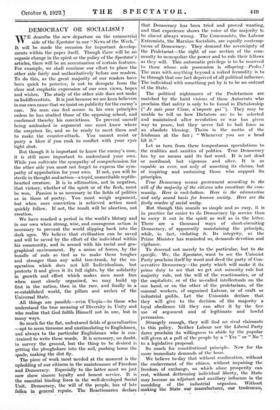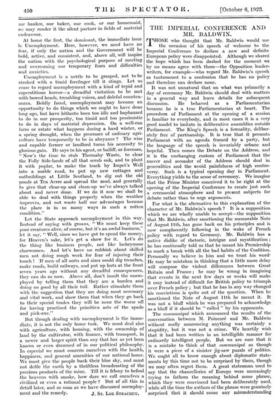DEMOCRACY OR SOCIALISM . ? - W E describe the new departure on
the commercial side of the Spectator in our " News of the Week." It will be made the. occasion for important develop- ments within the paper itself. Though there will be no organic change in the spirit or the policy of the Spectator's articles, there will be an accentuation of certain features.
For example, we shall continue our effort to place the other side fairly and authoritatively before our readers.
To do this, as the great majority of our readers have been quick to perceive, is not to derogate from the clear and emphatic expression of our own views, hopes and wishes. The study of the other side does not make us Indifferentists. It is just because we are keen believers in our own cause that we insist on publicity for the enemy's case. No man can feel secure in his own principles unless he has studied those of the opposing school, and confirmed thereby his convictions. To prevent oneself being ambushed in argument one must .know where the surprises lie, and so be ready to meet them and to make the counter-attack. You cannot resist or parry a blow if you rush to conflict with your eyes tight shut.
But though it is important to know the enemy's case, it is still more important to understand your own. While you cultivate the sympathy of comprehension for the other side you must not forget to express the sym- pathy of approbation for your own. If not, you will be sterile in thought and action—a tepid, unmeritable reptile- hearted creature. It is in affirmation, not in negation, that victory, whether of the spirit or of the flesh, must be won. Passion is as necessary in the fields of politics as in those of poetry. You must weigh argument, but when once conviction is achieved action must quickly follow. If not, the result will be abortion, not creation. • We have reached a period in the world's history and in our own when strong, wise, and courageous action is necessary to prevent the world slipping back into the dark ages. We believe that civilization can be saved and will be saved by the effort of the individual within his community, and in accord with his racial and geo- graphical environment. By a union of forces, by the bundle of rods so tied as to make them tougher and stronger than any solid tree-trunk, by the co- operation which does not kill Individualism, but protects it and gives it its full rights, by the solidarity in growth and effort which makes men most free when most closely organized, we may build up first in the nation, then in the race, and finally in a re-established world, the pillars and arches of the Universal State.
All things are possible—even Utopia—to those who understand the true meaning of Diversity in Unity and who realize that God fulfils Himself not in one, but in many ways. So much for the flat, unfeatured fields of generalization —apt to seem tiresome and unstimulating to Englishmen, and always to the particular Englishman who is con- :trained to write these words. It is necessary, no doubt, to survey the ground, but the thing to be desired is getting the ploughshare into the soil, pushing home the spade, making the dirt fly.
The piece of work most needed at the moment is the upholding of our citizens in the maintenance of Freedom and Democracy. Especially to the latter must we just now show sincere loyalty and honest service. It is the essential binding force in the well-developed Social Unit. Democracy, the will of the people, has of late fallen in general repute. The Reactionaries declare that Democracy has been tried and proved wanting, and that experience shows the voice of the majority to be almost always wrong. The Communists, the Labour Extremists, the Marxian Socialists, are equally contemp- tuous of Democracy. They demand the sovereignty of the Proletariat—the right of one section of the com- munity to monopolize the power and to rule their fellows as they will. This autocratic privilege is to be reserved to those whose sole possession is offspring—Proles ! The man with anything beyond a naked fecundity is to be through that one fact deprived of all political influence. The individual with something put by is to be an outcast of the State.
The political nightmares of the Proletarians are matched by the lurid visions of those Autocrats who proclaim that safety is only to be found in Dictatorship (" Je suis pour Cesar, n'importe qui"). They may be unable to tell us how Dictators are to be selected and maintained after revolution or war has given way to peace, but they never fail to hail force as an absolute blessing. Theirs is the motto of the Irishman at the fair ; " Whenever you see a head hit it."
Let us turn from these tempestuous speculations to the realities and sanities of politics. True Democracy has by no means said its last word. It is not dead or moribund, but vigorous and alive. It is as capable as ever, not only of asserting its claims, but of inspiring and sustaining those who support its principles.
True Democracy means government according to the will of the majority of the citizens who constitute the com- munity. Here is rock-bottom. Here is the adamantine and only sound basis for human society. Here are the lively oracles of social unity. . .
But though this sounds so simple and so easy, it is in practice far easier to do Democracy lip service than to carry it out in the spirit as well as in the letter. There are a thousand ways of short-circuiting Democracy, of apparently maintaining the principle, while, in fact, violating it. Its integrity, as the Prime Minister has reminded us, demands devotion and vigilance.
To descend not merely to the particular, but to the specific. We, the Spectator, want to see the Unionist Party proclaim itself by word and deed the party of Con- servative Democracy—the party which will make it its prime duty to see that we get not minority rule but majority rule, not the will of the reactionaries, or of the capitalists, or of the so-called intellectuals on the one hand, or on the other of the proletarians, of the manual workers, of organized Labour, or of craft or industrial guilds. Let the Unionists declare that they will give to the decision of the majority a loyal obedience till they can alter it by the free use of argument and of legitimate and lawful persuasion.
Strangely enough, they will find no rival claimants to this policy. Neither Labour nor the Liberal Party dares proclaim its willingness to abide by the popular will "given at a poll of the people by a " Yes " or " No '! to a legislative proposal. So much for constitutional principle. Now for the more immediate demands of the hour.
We believe to-day that without confiscation, without the enslavement of the citizen, without impairing the freedom of exchange, on which alone prosperity can rest, without dethroning individual liberty, the State may become an adjutant and auxiliary influence in the moulding of the industrial organism. Without Making the State our manufacturer, our tradesman, our banker, our baker, our cook, or our housemaid, we may render it the silent partner in fields of material endeavour.
At home the first, the dominant, the immediate issue is Unemployment. Here, however, we need have no fear, if only the nation and the Government will be bold, active, and consistent, and, above all, will inspire the nation with the psychological purpose of meeting and overcoming our temporary fears and difficulties and anxieties.
Unemployment is a nettle to be grasped, not to be stroked with a timid forefinger till it stings. Let us cease to regard unemployment with a kind of tepid and superstitious horror—a dreadful visitation to be met with bowed heads, trembling voices, and doleful counten- ances. Boldly faced, unemployment may become an opportunity to do things which we ought to have done long ago, but have hitherto been too idle and haphazard to do in our prosperity, too timid and too pessimistic to do in days of material depression. On a well-run farm or estate what happens during a hard winter, or a spring drought, when the processes of ordinary agri- culture have temporarily to be in abeyance ? The wise and capable farmer or landlord turns his necessity to glorious gain. He says to his agent, or bailiff, or foreman, " Now's the time to stub Thornaby Waste, to clear the Folly Side-lands of all that scrub oak, and to plant it with poplar, to make the track by Impet's Well into a usable road, to put up new cottages and outbuildings at Little Scotland, to dig out the old ponds at Ten Acres and spread the mud, and generally to give that clear-up and clean-up we've always talked about and never done. If we do it now we shall be able to deal with things properly when the weather improves, and not waste half our advantages because the place is in so many ways in such a rotten condition."
Let the State approach unemployment in this way. Instead of saying with groans, " We must keep these poor creatures alive, of course, but it's an awful business," let it say, " Well, since we have got to spend the money, for Heaven's sake, let's get a show for it. Let's do the thing like business people, not like lachrymose charwomen. And let's have no rubbish about skilled men not doing rough work for fear of injuring their touch ! If men of all sorts and sizes could dig trenches, make roads, build railways, and put up huts at the front seven years ago without any dreadful consequences, they can do so now. Above all, don't insult the unem- ployed by telling them that they are a burden and doing no good by all their toil. Rather stimulate them with the suggestion that they are doing most necessary and vital work, and show them that when they go back to their special trades they will be none the worse off for having practised the primitive arts of the spade and pick-axe."
But though dealing with unemployment is the imme- diate, it is not the only home task. We must deal also with agriculture, with housing, with the ownership of land by the cultivator, with finance, with transport, in a newer and larger spirit than any that has as yet been known or even dreamed of in our political philosophy. In especial we must concern ourselves with the health, happiness, and general amenities of our national home.
We must give the people back their blue sky, and must not defile the earth by a thriftless broadcasting of the precious products of the mine. Till it is felony to befoul the heavens with smoke, how dare we call ourselves a civilized or even a rational people ? But of all this in detail later, and as soon as we have -discussed unemploy-











































 Previous page
Previous page